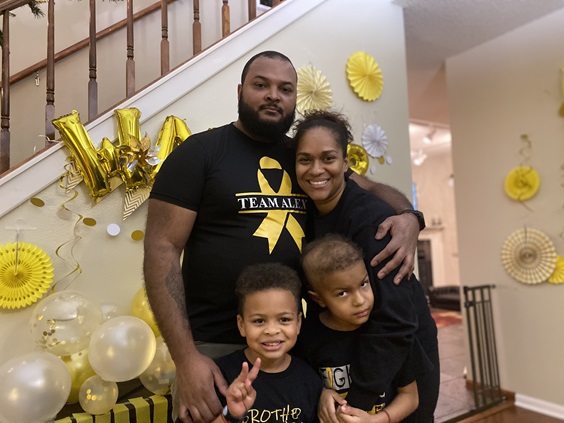An unexpected discovery
“The pediatric neurologist in Austin called me up the next day,” said Nina. “I knew by the sound of her voice it was bad news. At that moment, I felt like my whole world came crashing down on me.”
The MRI detected a tumor, the size of a golf ball, in Alex’s brain. He would need immediate surgery to remove the suspicious growth. A biopsy would follow to determine if the tumor was malignant.
“We were devastated and heartbroken,” said Nina. “We didn’t know what to think. It was so hard to process everything at that moment. We ended up having Alex’s brain surgery in San Antonio closer to our home. The pediatric neurologist in Austin referred us to the neurosurgery team at CHRISTUS Children's.”
Within minutes, Nina got a phone call from CHRISTUS Children's. They wanted to see Alex as soon as possible.
When the Winters arrived at the emergency room, they met with Linh Reeves, PA-C, a physician assistant on the neurosurgery team and Dr. Mark Lee, the section chief of pediatric neurosurgery at CHRISTUS Children's, who addressed all their questions and concerns, and prepared them for what to expect during surgery.
“Linh and Dr. Lee went over the results of the MRI in greater detail with us,” said Nina. “Dr. Lee showed us pictures of the tumor and described his plan of action for removing the growth. We also learned Alex had another complication that was directly related to the growing tumor in his brain.”
The MRI results showed Alex had obstructive hydrocephalus, a life-threatening condition in which excess cerebrospinal fluid builds up within the cavities or ventricles of the brain as a result of an obstruction. The tumor in Alex’s brain had blocked the cerebrospinal fluid from draining properly.
“When facing a frightening situation like this for the first time, there are so many questions and so many unknowns that flood your mind all at once,” said Nina. “But Dr. Lee and his team made us feel more comfortable about everything. Dr. Lee explained the benefits and risks of the procedure. He made us feel more at ease going into Alex’s surgery. The only thing we knew was that our son had a tumor – we didn’t know if it was cancerous or benign – but we prayed for the best outcome.”
Preparing for brain surgery
The day of Alex’s surgery was an emotional time for the Winters. While they were hopeful that everything would go well, part of them still felt scared and nervous. Alex was anxious, too.
On September 22, 2022, Dr. Lee and his team performed the three-hour brain surgery. The goal of the surgery was to remove as much of the tumor as possible without damaging nearby healthy tissue, and to reduce the pressure inside the brain caused by the tumor blocking the cerebrospinal fluid.
“We were updated continually while our son was in surgery,” said Nina. “That helped put our minds at ease. We were never left in the dark. When Dr. Lee talked to us after Alex’s surgery, he said he was able to remove the entire tumor from his brain. That’s when I broke down in tears. That was the best possible outcome we could have prayed for. After surgery, Alex spent three days in the PICU. He was sedated, so we did not talk to him until the third day when he started waking up.”
While the brain surgery was a success, Alex was not out of the woods yet.
After the complete tumor resection, the brain tumor was sent to pathology to determine if it was cancerous or benign. When the results came back, the tumor was a malignant medulloblastoma.
Medulloblastoma is a cancerous tumor that starts in the cerebellum (the lower part of the brain) and can spread through cerebrospinal fluid to other areas of the brain and spinal cord. The tumor and buildup of pressure in Alex’s brain were responsible for his painful and recurring headaches.
“Because medulloblastomas are invasive and spread into the surrounding healthy cerebellum, there is always a chance some cancer cells remain after surgery,” said Dr. Lee. “Follow-up chemotherapy and/or radiation are usually part of the post-surgical treatment plan to target any remaining cells.”

